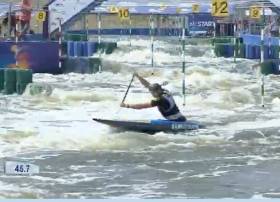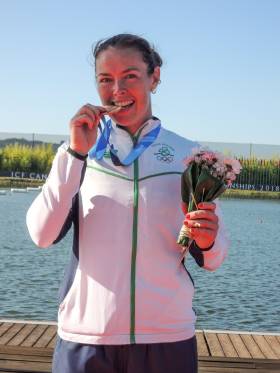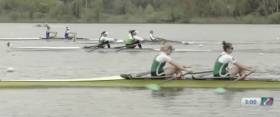Displaying items by tag: Bronze Medal
#Canoeing: Ireland’s Liam Jegou took bronze at the canoe slalom World Championships in Krakow, Poland.
Liam Jegou looked well on course in the final of the C1 – only to touch gate 14. This pushed him out of gold medal place, but his raw time was so good that he finished third behind two France paddlers, Nicolas Gestin and Lucas Roisin.
Canoe Slalom Under-23 World Championships, Krakow (Irish interest)
Men, C1 Semi-Final: 4 L Jegou 93.79
Final: 3 Jegou 91.97.
Jenny Egan Takes Bronze Medal at Canoe Sprint World Championships
#Canoeing: Jenny Egan produced a spirited fightback to take a bronze medal at the canoe sprint World Championships – her first in this championships. The Ireland K1 paddler fell back after a disappointing start at Montemor O Velho and had to claw her way from 15th to third. Lizzie Broughton of Britain sprinted away to take gold, with Maryna Litvinchuk of Belarus taking silver. Egan took bronze at the canoe marathon World Championships in 2017 and will compete in the marathon event again next month.
Canoe Sprint World Championships, Montemor O Velho, Portugal (Irish interest)
Women
K1 5,000 metres: 3 J Egan 24 min 15.08 sec.
Puspure and Dukarska Team Up to Take Sculling Bronze
#Rowing: Sanita Puspure and Monika Dukarska teamed up in a double to take a bronze medal at the Memorial Paolo d’Aloja in Italy today. The Ireland crew led early on and stayed in the mix as Lithuania took over the lead. In a dash for the line, Ireland and South Africa fought it out for silver, with the South Africans just taking it.
Ireland had earlier taken a medal in the single sculls through Emily Hegarty, who also took bronze.
Memorial Paolo d’Aloja International Regatta, Piediluco, Italy (Irish interest)
Sunday
Women
Double Sculls – A Final: 1 Lithuania 7:07.04, 2 South Africa 7:09.36, 3 Ireland (S Puspure, M Dukarska) 7:09.88.
Single Sculls – A Final: 1 Ukraine (D Dymchenko) 7:52.35, 2 Lithuania (L Saltyte) 8:11.90, 3 Ireland (E Hegarty) 8:14.76.


























































